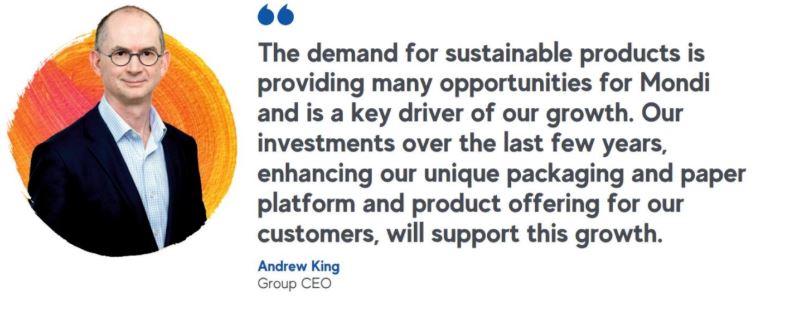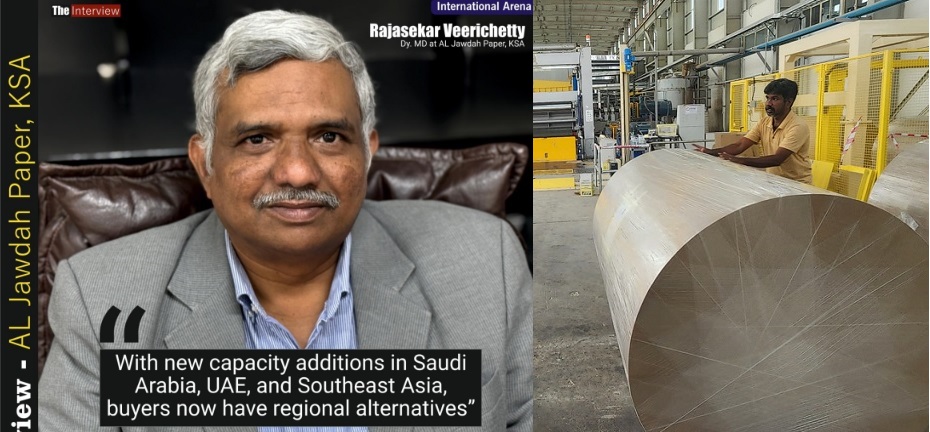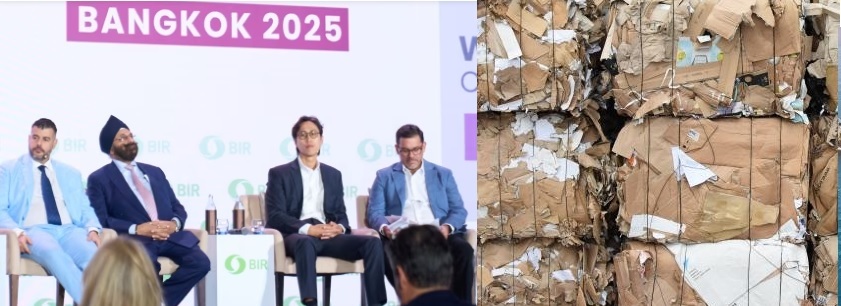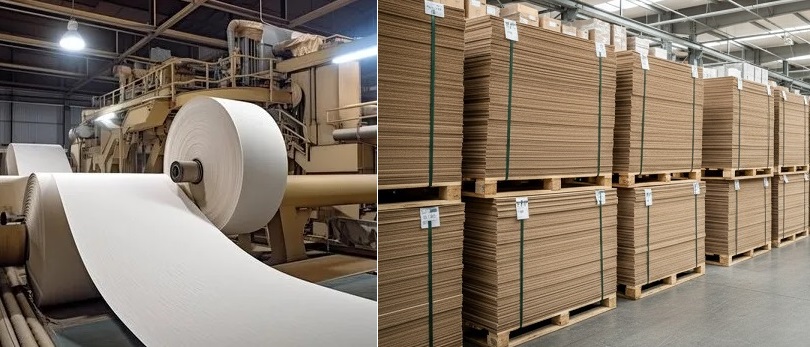"WSR may encourage Indian paper producers to meet higher environmental standards and diversify their sources of recovered paper imports," says Ms. Hannah Zhao, Director of Fiber at Fastmarkets RISI

"WSR may encourage Indian paper producers to meet higher environmental standards and diversify their sources of recovered paper imports," says Ms. Hannah Zhao, Director of Fiber at Fastmarkets RISI
Key Points
-Recycled fiber is expected to further increase its share in the fiber furnish mix for the global paper and board industry
-We believe the trade conflict could have a fundamental impact on the global recovered paper market by disrupting trade flows, slowing global economic growth, affecting the paper packaging market, and ultimately weakening demand for recovered paper
-Recycled fiber can offer cost advantages over virgin fiber, depending on market conditions
-Smaller producers struggling with (EDUR) compliance may exit the market, leading to consolidation
In an exclusive conversation with The Pulp and Paper Times, Ms. Hannah Zhao, Director of Fiber at Fastmarkets RISI, delves into the intricate challenges and opportunities within the recovered paper trade. She sheds light on the recovered paper market and the growth of the pulp and paper industry in India and Asia, future trends, price prospects, the impact of WSR on paper mills, the shift of paper mills toward recovered paper amid cheap imports. Additionally, she highlights the risks associated with EDUR and geopolitical uncertainty. Ms. Hannah Zhao shares her invaluable insights into the nuanced landscape of the industry. Here is her full interview.
The Pulp and Paper Times
Q: Could you please give a brief introduction to Fastmarkets RISI?
Fastmarkets is a leading price reporting agency (PRA) and provider of market intelligence in the agriculture, forest products, metals and mining, and new generation energy markets.
Q: How do you evaluate the current market conditions for India and China, specifically in the recovered paper segment, regarding demand and pricing trends? Also, how do you analyze the growth of paper consumption?
Indian recovered paper demand is expected to continue expanding, supported by the rapid growth in its recycled-fiber-based paper packaging production—particularly in containerboard and boxboard. The country’s strong economic growth will further sustain steady and robust development in its paper packaging markets. Meanwhile, Chinese recovered paper demand is also projected to grow, though potentially at a slower pace. Chinese paper producers have been increasingly shifting toward virgin fiber usage due to limited availability of high-quality imported recycled fiber.
Q: The import of OCC to India has declined significantly due to the Red Sea crisis and reduced demand. What is your perspective on the recovered paper demand trend amid growing capacities in Southeast Asia and Europe?
We think demand for recovered paper will maintain steady growth, primarily fuelled by the ongoing expansion of recycled-fiber-based paper packaging capacity. As sustainability trends strengthen, recycled fiber is expected to further increase its share in the fiber furnish mix for the global paper and board industry.
Q: What are the global consumption trends and evolving trade patterns amidst geopolitical uncertainty?
Geopolitical uncertainties can lead to more cautious consumer behaviour, raise inflation and purchasing power, slow consumer spending. Geopolitical uncertainties, such as the recent imposition of broad tariffs by the United States, have disrupted traditional trade routes, prompting countries to seek alternative markets, to reduce reliance on U.S. trade.
Q: The U.S. has imposed a 25% tariff on imports from Canada and Mexico. Do you anticipate that paper mills in Canada, China, and Mexico will seek new export markets, such as Southeast Asia or India, in response to these tariffs? How do you see this tariff war impacting the recovered paper trade?
Frequent and abrupt changes in U.S. tariffs created a highly unpredictable trade environment, making it difficult for businesses to plan ahead. In response, producers in affected countries likely sought to reduce their reliance on the U.S. market, diversifying their export destinations to mitigate risk. We believe the trade conflict could have a fundamental impact on the global recovered paper market by disrupting trade flows, slowing global economic growth, affecting the paper packaging market, and ultimately weakening demand for recovered paper.
Q: A trend is emerging in the industry where a few A-grade mills in India have significantly reduced their reliance on virgin wood fiber by increasing the use of recycled paper (waste paper). Do you think high wood costs and cheap imported paper are the reasons behind this shift?
Recycled fiber can offer cost advantages over virgin fiber, depending on market conditions. Growing consumer demand for environmentally friendly products is driving companies to adopt sustainable practices. Incorporating recycled fiber and promoting paper recycling not only showcase corporate responsibility but also align with market expectations for sustainability. Governments and international bodies also implement more regulations and incentives to encourage recycling and the use of recycled materials, influencing producers to adjust their fiber sourcing strategies accordingly.
Q:The European Union Deforestation Regulation (EUDR) mandates that products be deforestation-free, produced in compliance with relevant laws, and accompanied by a due diligence statement with precise geographic coordinates. How do you foresee the graphic paper and pulp market evolving post-EUDR implementation?
The EUDR may force pulp and graphic paper producers that cannot comply with its requirements to seek alternative markets, potentially disrupting existing trade patterns. Smaller producers struggling with compliance may exit the market, leading to consolidation. Additionally, the EUDR incentivizes sustainable sourcing and production methods, offering opportunities for companies to adopt more sustainable practices within the pulp and paper industry.
Q: During the Paper Division session of the BIR, it was emphasized how crucial carbon credits and artificial intelligence (AI) will be for the recovered paper industry going forward. How can artificial intelligence technology help the recovered paper industry?
By recycling paper, the industry significantly reduces greenhouse gas emissions compared to producing paper from virgin materials. This reduction can be quantified and translated into carbon credits, which can then be sold to companies aiming to offset their emissions. The recovered paper sector's ability to generate carbon credits positions it as a key player in achieving sustainability objectives. Integrating AI into the recovered paper industry can improve sorting efficiency and improve the quality of recovered paper. It can also help to enhance the resource efficiency and optimize the supply chain.
Q:Do you believe mergers and acquisitions in global pulp production could lead to a monopolistic market for paper manufacturers in the near future?
Sorry, no comment.
Q:The strict Waste Shipment Regulation (WSR) of the EU could disrupt the market dynamics of the recovered paper trade. How do you forecast the circular economy impacts post-WSR, specifically for India?
India has already submitted an application to import RCP from the EU, correct? I agree that the WSR could temporarily disrupt recovered paper exports from Europe to India. To some extent, the WSR may encourage Indian paper producers to meet higher environmental standards, diversify their sources for recovered paper imports, and promote greater domestic collection to reduce reliance on imports.
Q: Finally, how do you predict the overall waste paper market growth in 2025 amid overcapacities and cheap imports of paper?
Overcapacity is not only a concern for India but also a challenge for the global paper industry. Overall, India has a relatively healthy economy, particularly within its manufacturing sector, which should help sustain the paper packaging sector and demand for recovered paper (RCP). However, if trade tensions continue to escalate and escalate to a level that disrupts the global economy, most regions, including India, will be impacted.
Web Title: "WSR may encourage Indian paper producers to meet higher environmental standards and diversify their sources of recovered paper imports," says Ms. Hannah Zhao, Director of Fiber at Fastmarkets RISI




 Join WhatsApp Group
Join WhatsApp Group Join Telegram Channel
Join Telegram Channel Join YouTube Channel
Join YouTube Channel Join Job Channel (View | Submit Jobs)
Join Job Channel (View | Submit Jobs) Join Buy Sell Channel (Free to Submit)
Join Buy Sell Channel (Free to Submit) Paper News Headlines Channel (Free to read)
Paper News Headlines Channel (Free to read)















